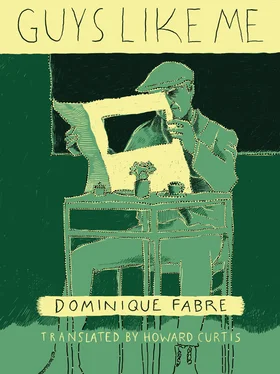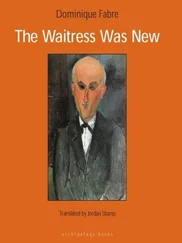Their children were all at the movies, together, Marc’s and Aïcha’s, a reconstructed family. I’ve often thought about that. I’ve heard about it at work too. How do people manage that? I’ve never wanted to talk about it with Marco, whose life, in many respects, is like a criticism of mine, his choices against mine, and yet we’re friends. Maybe that’s part of the reason we’re friends. Jean wasn’t talking much, as if he had to learn how to talk all over again. I remembered that feeling that you’ve forgotten how to say things, it had happened to me between my divorce and being hired by the company where I’m still working today, but with him there was something else. Every once in a while, Aïcha glanced at the balcony. She said she wanted Marco to put up a hammock there, so that they could take afternoon naps when the weather was fine. He’d always tell her it was impossible. She’d ask why. They always got very heated about this hammock business. Jean perked up a bit on the subject, he’d spent a lot of time in northern Europe, and in Germany. He’d been on the road in the old days. After a while, his description of a trip to Norway got lost in limbo, and I couldn’t help meeting Marc-André’s amused gaze, we both felt like laughing, the way we had before. How slow he was these days.
Aïcha doesn’t usually talk much. But she follows everything, commenting on it with a nod or a shake of the head, it’s as if she knows hundreds of ways to do that. Marc-André is lucky to have found her, at an age when it was still possible to change. I tell myself that sometimes, when I’m alone and indulge in the jealousy of regrets. Then I’m no longer so sure, because even knowing his happiness, it seems too good for me. Since I’ve been living alone, I’ve often been ashamed of who I am, as if I’ve been spending too much time with myself. And yet I’m also part of guys like him, in a sense. Except that I have a job, so I don’t have time these days to show my cracks, or let them open up even more. He was talking in an even tone, he seemed to be happy that evening. Aïcha put on some music, old stuff we all liked, I still know three albums by Leonard Cohen by heart, we sat down on the couch. After a while, the telephone rang.
“Excuse me,” she murmured.
Marco followed her with his eyes until she closed the door of their bedroom behind her. He’d sometimes talked to me about this. Aïcha’s mother could spend hours on the phone and, to his wife, it was unthinkable to say stop, I’m in a hurry, I’ll call you back, she couldn’t do that. It scared him every time, although he couldn’t explain it. Was he afraid that she’d leave one day after hanging up? He poured some more wine, there was much more to this phone business than just the phone. Once, when I’d told him that, he’d shrugged, he’d looked at me with those dark, feverish eyes of his, which he’s always had since we’ve known each other.
“That’s it, it’s her mother,” he said.
He didn’t seem to realize. He’d resumed his place at the end of the big couch in the corner of the room. They’d bought that couch for a ridiculously high price, I’d helped him to transport it in a rented Peugeot J7. He’d been pleased to do it with me. Aïcha spoke three languages in addition to ours, more beautifully than us, because it was Lebanese French that she spoke.
“By the way,” Marco said, looking at Jean, “I think I have something for you. Anyway, we can always try, the guy knows all about you.”
His eyes shone for a brief moment, while Marco explained to him what the work consisted of. Yes, they’d already checked his résumé.
“Do you think I’ll be able to do it?”
Yes, it was right up his alley. He’d spent ten years with Linotier, hadn’t he? Yes, until they closed following the buyback. The salary wasn’t what he might reasonably expect, obviously. But it was a question of take it or leave it. I stopped myself from smiling, all the time Marco was explaining the job to him with his usual brusqueness, which is nothing like the fake kindness I sometimes assume in order to do nothing. Jean was listening the way you listen to a story that’s somehow too mysterious to be really interesting. He nodded from time to time. If I’d been in Marc-André’s place, it would have irritated me. I decided not to mention the translation. He might have felt un-comfortable being indebted to both of us the same time, while Aïcha was talking to her mother in Beirut, shut up in their bedroom after eleven at night. Toward the end, he stammered that he didn’t know what to say, but Marc-André was only interested, so to speak, in the door of the bedroom, with his dark eyes.
“Is everything all right, Marco?”
After a while, as if he couldn’t hold out any longer, he excused himself. When he came back, he was looking straight ahead of him at the window to the balcony, trying to put on a bold front, but he seemed hurt.
When Aïcha rejoined us, the embarrassment faded rapidly. It was a nice evening. We celebrated the news, even though we were counting our chickens before they hatched. That expression made me laugh, I must have been a little drunk, and when they asked me why, I said it was a strange phrase, why should people bother to count chickens anyway? I’d also had too much aperitif, before that. Aïcha laughed at my joke, yes, she said, why should people count chickens? And how about you, how are things with you? We were both in the middle of putting our plates in the dishwasher. How’s Benjamin? She lit a cigarette.
“He’s fine.”
“Do you have anyone right now?”
I felt myself blush like a young man for the second time that evening. I said no, a few dates, you know how it is, it isn’t so easy to find love. She held out her hand.
“You’ll find her one day, when you’ve stopped looking!” Her eyes were smiling. We both laughed together, in the kitchen.
As we got out of the elevator downstairs, we ran into their children coming back from the movies. Marc-André’s daughter kissed me on the cheek, and then they took the stairs. We were both on the street now. He was still carrying his case.
He pointed. “Right, I’m going to Porte de Champerret. There’s a night bus that goes to La Garenne-Colombes.”
I suggested walking with him part of the way because I didn’t feel like going straight home. We didn’t talk much.
“Nice evening, wasn’t it?”
“Yes, it was.”
By the way, he hadn’t yet finished the translation. I told him not to worry, if he could give it to me by the end of the following week, it’d be fine. It was better to take too much time than too little, if he wanted it to be well received. We walked like two shadows, his empty case between the two of us. We were a long way from all those years together, when it came down to it. But anyway, we really had had a nice evening. He might have a job, at his age he hadn’t expected that. We sat down on a bench in the big bus station at Porte Champerret. A lot of young people, with their headphones in their ears or their cell phones on, a few couples too. A lot of guys like him and me who didn’t have cars. They’d be going a long way, when the night bus finally arrived. He was pleased. He told me in a low voice that, more than once, he’d thought to end it all, because he couldn’t bear not having anything to do, day after day, night after night. I let him speak without interrupting him. What do you say to someone who confides his fears in you, his desire to end it all, when you yourself don’t know? Another guy like me, that’s what you are, my brother. Who’d want to abandon his brother, or refuse to hear him? We’d meet again soon.
Life resumed its course. I called Marie, who I definitely couldn’t get out of my head. We met on Tuesday evening near Chaussée d’Antin. We went to a café she knew, she struck me as pretty right from the start, I think. She was smiling at me, I hadn’t been very sure I’d recognize her. But in the end, I did. She really was the age she’d told me, and so was I. We sat down, surrounded by a whole bunch of women who worked in the big department stores, she spent a lot of time in this neighborhood. I used to go there too, as a child, with my mother, but in those days it hadn’t yet been rebuilt. The area around Passage du Havre and Chaussée d’Antin had been part of the magic of the world for me. It was also here that I’d known a woman for the first time, in the biblical sense, to use Marc-André’s phrase. He went with me to the place where I’d spotted her on the sidewalk several Sundays running, on Rue de Mogador. Marie ordered tea. She was a nurse. Right now, she was working for a local organization that helped people with HIV, she’d traveled a lot before that. She’d worked for various humanitarian organizations, she’d kind of drifted into it. She was pleased she’d been away so long and had come back after it all. It had only been two years. Time passes, doesn’t it?
Читать дальше












